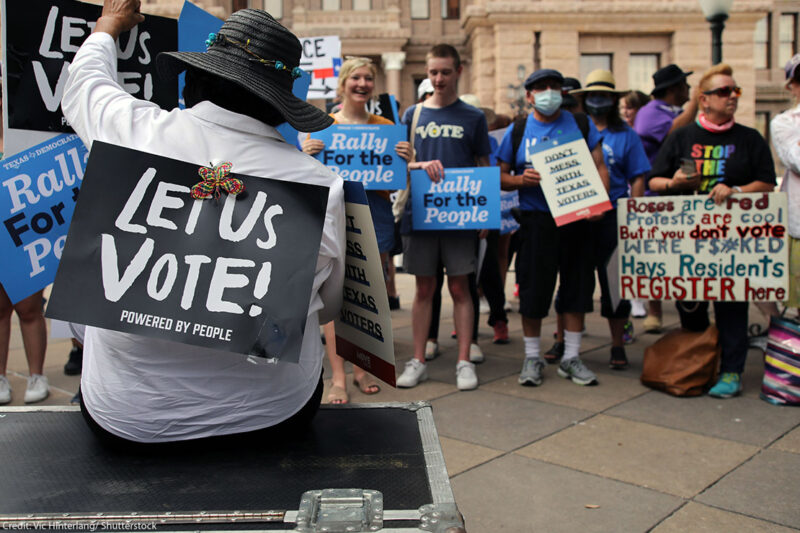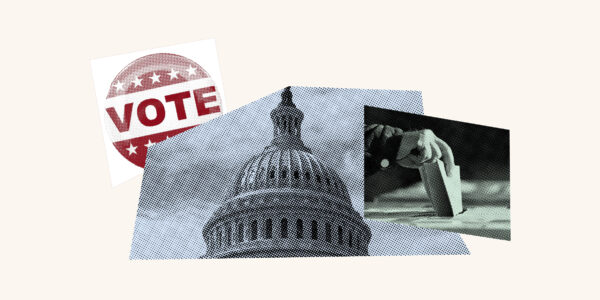Accessible Voting is Under Attack 35 Years After the ADA


Editor's Note: Shayla Mitchell is the election protection organizer for the Õ¯∫ϱ¨¡œ of Alabama. She works every day to ensure Alabamians can access the polls freely, safely, and fairly. Her motto is ‚ÄúLocal is Vocal.‚Äù As a Black organizer and disability advocate, she has seen how local attacks on voter access can become a national precedent. Consider her your ‚ÄúElection Protection Bestie‚Äù if you ever visit Alabama.
The Civil Rights Movement began in humble living rooms, at busy lunch counters, and across church pews in Alabama where people gathered to demand a voice in democracy. The Americans with Disabilities Act (ADA), signed into law on July 26, 1990, is part of that same tradition. The ADA stands on the shoulders of the Civil Rights Act of 1964 and the Voting Rights Act of 1965, carving out legal protections so people with disabilities could fully participate in public life, whether that’s gaining employment or casting a ballot.
This July, the Õ¯∫ϱ¨¡œ commemorates the 35th anniversary of the ADA, recognizing it as a living civil-rights protection that we will never stop fighting to uphold. The ADA prohibits discrimination against people with disabilities in all areas of public life. It promises access to employment, government services, public spaces, and crucially, the ballot box. Yet here in Alabama, and across the country, these promises are fragile.
"At the Õ¯∫ϱ¨¡œ of Alabama, we know that voting rights are disability rights."
At the Õ¯∫ϱ¨¡œ of Alabama, we know that voting rights are disability rights. In 2024, nearly fell under the ADA‚Äôs protection. Nationally, one in five eligible voters live with a disability. But the simple act of voting, from accessing a polling place to mailing a ballot, remains a battleground.

Voters with Disabilities

Voters with Disabilities
The Õ¯∫ϱ¨¡œ of Alabama, works every day to ensure that the promise of the ADA reaches the voting booth. And this year‚Äôs anniversary is a call to action. From restrictive legislation to inaccessible polling places, barriers still undermine the rights of voters with disabilities. Right now,three major threats could affect us all on Election Day and highlight why defending the ADA remains crucial.
The Fight Against Alabama’s SB1
One of the most urgent threats came in March 2024, when Alabama Governor Kay Ivey signed Senate Bill 1 (SB1) into law. Under SB1, organizations assisting a voter with requesting, filling out, or delivering an absentee ballot application could face criminal charges, with penalties of up to 20 years in prison. The law’s vague language labels even small acts of kindness (like giving a neighbor gas money to drive their ballot to the post office) as potential “gifts” and criminal offenses.
During public hearings, the law’s sponsors made it clear: they intend to criminalize the assistance on which voters with disabilities often rely. Ironically, these same lawmakers represent districts where absentee voting has historically been common, with averages as high as 72 percent. In the months since SB1 passed, absentee voting participation in Alabama has plummeted.
Nationally, SB1 has sent a chilling message: helping people exercise their right to vote, even when required by federal law like the ADA, could now carry legal risk. For voters with disabilities, who frequently rely on trusted friends or organizations for ballot assistance, this legislation amounts to voter suppression by another name.
The Ongoing Crisis of Inaccessible Polling Places
In 2024, the Alabama Election Protection Coalition identified polling sites with broken or absent ramps, doors that couldn’t be opened without significant force, hazardous mold, and inadequate lighting. These conditions violated the ADA and deterred voter participation.
Through direct advocacy, counties across Alabama were compelled to conduct ADA compliance audits of their polling places. But we quickly discovered another gap: there was no centralized, reliable public list of polling locations anywhere in the state. Even the secretary of state’s office lacked a comprehensive listing six months before the primary election.
To fill this gap, the Õ¯∫ϱ¨¡œ of Alabama partnered with the Legal Defense Fund‚Äôs Black Voters on the Rise Program and Rollin‚Äô to the Polls to create a Nonpartisan Statewide Polling Location Directory. This resource now informs voter mobilization efforts, helps protect against disenfranchisement, and guides our targeted advocacy for ADA compliance in underperforming counties.
We’re pushing forward with strategies to ensure every voter can safely and confidently access their polling place, especially in Alabama’s Black Belt, where infrastructure often lags behind. That means relocating inaccessible polls, consolidating polling places for efficiency, and ensuring compliance through direct engagement with local election officials.
Rising Obstacles to Vote Across The Country
The threats to voters with disabilities aren’t confined to Alabama. The Trump administration’s March 2025 executive order on “Protecting the Integrity of American Elections” and the House’s passage of the "Safeguard American Voter Eligibility Act," or the SAVE Act,have both raised alarms among disability rights advocates. These measures expand avenues for disenfranchisement, with consequences for voters covered under the ADA.

Voting Rights
Racial Justice
Allen v. Milligan

Voting Rights
Racial Justice
Allen v. Milligan
In May 2025, a federal court ruled in Milligan v. Allen that Alabama’s legislative maps intentionally disenfranchised Black voters, yet similar fights continue in Louisiana, Mississippi, Texas, and beyond. Voter ID laws and inaccessible government buildings further compound the barriers. For many, updating voter registration requires physical access to offices they can’t safely enter.
We Must Defend the ADA’s Legacy
These threats underscore why the ADA’s 35th anniversary is more than ceremonial. In Alabama and across the Deep South, we’ve seen how local attacks on disability access become the national precedent. Safe, fair, and accessible elections aren’t a privilege. They're a right protected by the ADA. For 35 years, this law has been a lifeline. Our job now is to ensure it stays that way for the next 35 years and beyond.
At the Õ¯∫ϱ¨¡œ, we are proud to stand alongside advocates from REV UP (AAPD), Alabama Disabilities Advocacy Program (ADAP), League of Women Voters (LWV), NAACP, Southern Poverty Law Center (SPLC), Stand Up Mobile, Greater Birmingham Ministries (GBM), and Restore Your Vote to fight for our voting rights in courtrooms, legislatures, and at every polling place. Together, we remind people that democracy is for everyone.
"Together, we remind people that democracy is for everyone."
